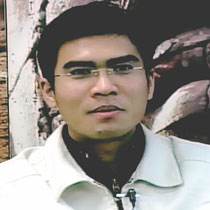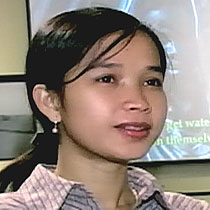2007年VOA标准英语-Learning Lessons from the Past(在线收听)
Washington
25 April 2007
The atrocities committed by the Khmer Rouge in Cambodia during the late 1970s represent one of the worst human tragedies of the 20th century. Through execution, starvation and forced labor, this genocide left nearly two million Cambodians dead.
Today, the Documentation Center of Cambodia, or DC-Cam, is working to document the many crimes and atrocities committed during the Khmer Rouge's reign. Recently, two young staff members of the Center were in Washington, D.C. for internships at the United States Holocaust Memorial Museum to learn how to better document Cambodia's tragic past. For producer Ana Ward, VOA's Jim Bertel has their story.
Ser Sayana and Dy Khamboly are both in their twenties, too young to remember the horrors and suffering under the Khmer Rouge. The two writers work for the Documentation Center of Cambodia, a non-profit organization that collects documents and testimonies related to Khmer Rouge's atrocities. Dy is the author of a high school textbook on the Khmer Rouge.
"The Documentation Center of Cambodia aims to achieve two objectives: justice and we would like to preserve the memory of the Khmer Rouge (atrocities) for younger generations,” says Dy. “So, this way we preserve the memory of the Khmer Rouge, the history of the Khmer Rouge so that people will learn and remember and not repeat that mistake again in the future."
According to a study done by the Documentation Center, 65 percent of the population that survived that period still has traumatic memories related to the genocide nearly three decades after the fall of the Khmer Rouge.
 |
| Dy Khamboly |
During the researchers' time at the Holocaust Museum, they learned about conservation, preserving artifacts and keeping an archive. The two hope this will enable them to start a genocide museum in Cambodia. Ser believes the museum will help her country recover from its past.
 |
| Ser Sayan |
At the Holocaust Museum Ser and Dy studied displays on Nazi-occupied Europe and contemporary genocides, like the crisis in Darfur.
Bridget Zilkicis is a Project Director with the Holocaust Museum and mentored the two young writers. "The Cambodian project is at a different stage of course than the Holocaust Museum. They're just getting started, but a lot of the issues that they have, are similar to the ones we struggle with on a day-to-day basis and how do you tell these horrible stories in a way that engages people rather then turns them away? In the end we have the same goal essentially, it is to take a traumatic history and make it part of a process of learning not to do that again."
To that end, Ser and Dy plan to introduce the study of comparative genocide to college students in Cambodia, comparing their country's own horrors with the genocides in Rwanda, Darfur and the Holocaust. They believe this will help young people to learn from the past and see that these atrocities never happen again.